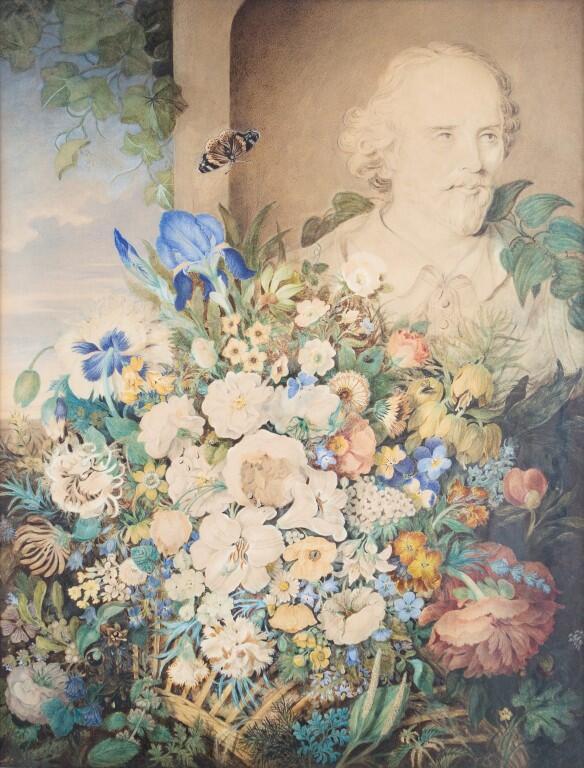Clara Maria Pope (1767-1838), Shakespeare's Flowers, 1835. P319
This work, painted by the artist Clara Maria Pope is one that most commonly catches the eye of visitors during tours of our Private Apartments. An 1837 inventory of the Soane describes it as 'The Bust of Shakespeare encircled by all the Flowers mentioned in his Works'. The bust seems to be that of Shakespeare by Scheemakers, of which Soane owned a cast (the original is on the poet's monument in Westminster Abbey). Read the full description of this work on our Collections Online database >
If you’d like to try and have a go at listing them yourself, we’ve listed the answers – and the sources – below. These answers are taken directly from a note supplied by the artist herself, which was provided with the painting when it was acquired by Soane.
Aconite - Henry IV part 2
Bramble - As You Like It, [The] Tempest
Broom - [The] Tempest
Brier or Eglantine - [A] Midsummer Night’s Dream, Cymbeline, As You Like It
Butterflies - Coriolanus
Balm - Anthony and Cleopatra
Burnet - Henry V
Coloquintida - Othello
Crown Imperial - [A] Winter’s Tale
Cowslips - [The] Tempest, Cymbeline
Columbine - Hamlet, Loves Labours Lost
Common Rose - [A] Midsummer Night’s Dream
Cuckoo Flowers & buds or Ladies’ Smocks - [King] Lear, Loves Labours Lost
Camomile - Henry IV part 1
Carnation - [A] Winter’s Tale
Clover - Henry V
Daisies Red - Loves Labours Lost, Hamlet
Dew Drops - Loves Labours Lost
Damask Rose - [A] Midsummer Night’s Dream, Sonnets
Daffodils - [A] Winter’s Tale
Flax - [King] Lear, Henry V
Fennel - Hamlet, Henry IV part 2
Fumitory - [King] Lear, Henry V
Furze - [The] Tempest
Gilly Flowers -[A] Winter’s Tale
Long Heath - [The] Tempest
Honeysuckles or Woodbine - Much Ado About Nothing
Hawthorn - [A] Midsummer Night’s Dream, [King] Lear
Heartsease - [A] Midsummer Night’s Dream, [King] Lear
Hare Bell - Cymbeline
Hemlock - [King] Lear
Henbane - Hamlet
Hyssop - Othello
Ivy - [A] Midsummer Night’s Dream
Iris - Troilus and Cressida, All’s Well That Ends Well
Knotgrass or Darnel - [A] Midsummer Night’s Dream
Love in Idleness - [A] Midsummer Night’s Dream
Lilly - Cymbeline, Loves Labours Lost
Lady Bird - Romeo and Juliet
Long Purples - Hamlet
Laurel - Titus Andronicus, Henry VI part 3
Lavender - Hamlet
Mallow - Measure for Measure, Anthony and Cleopatra
Mint - Loves Labours Lost
Marjoram - All’s Well That Ends Well, Lear, Loves Labours Lost, Romeo and Juliet
Marygolds - [Pericles,] Prince of Tyre
Mandragora - Othello
Mistletoe - Titus Andronicus
Nettles - Othello, Coriolanus, Richard II
Oxlips - [A] Winter’s Tale, [A] Midsummer Night’s Dream
Peony - [The] Tempest
Primroses - Cymbeline, Henry VI part 2, [A] Midsummer Night’s Dream
Parsley - [The] Taming of the Shrew
Pimpernel - [The] Taming of the Shrew
Plantain - Romeo and Juliet
Pansies - Hamlet
Poppy - Othello
Rosemary - Hamlet, Romeo and Juliet, [King] Lear, [Pericles,] Prince of Tyre
Rose – Crimson White Red, York & Lancaster - [A] Midsummer Night’s Dream, [The] Taming of the Shrew, Romeo and Damask Juliet, Hamlet, Sonnets, Henry VI part 3, Union of the white & red roses in Richard I, Henry IV part 1
Rue - Hamlet
Spear Grass - Henry IV part 1
Savory - [A] Winter’s Tale
Thistle - Much Ado About Nothing
Thyme - [A] Midsummer Night’s Dream
Vetch - [The] Tempest
Violets - Hamlet, Loves Labours Lost, Cymbeline, [A] Midsummer Night’s Dream, Romeo and Juliet, [A] Winter’s Tale, [Pericles,] Prince of Tyre
Wallflower - [A] Winter’s Tale,
Wormwood - Romeo and Juliet, Hamlet
The note ends:
"Onions, Leeks and Garlic are under the roses in the basket. The Laurel over the shoulders of the bust is called the Alexandrian Laurel, and is what the Ancients used to crown their heroes. Clara Maria Pope,1835".
